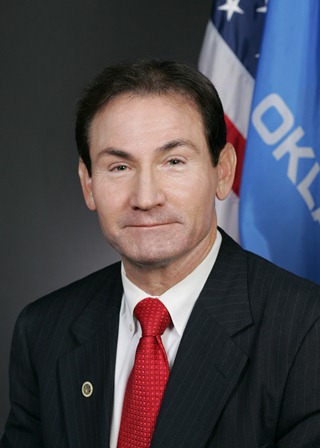Sen. Sharp offers alternative to suspensions and expulsions for disruptive students
 Sen. Ron Sharp
Sen. Ron Sharp
In an effort to address growing discipline problems in public schools, Sen. Ron Sharp has filed legislation offering schools an alternative to suspending or expelling students for bad behavior. Senate Bill 1345 would allow school districts to voluntarily issue fines or community service to students who misbehave as punishment rather that giving them in-school or out-of-school suspension.
“I realize to some this may seem extreme but educators who have to deal with disruptive students on a daily basis are in desperate need of alternatives. The typical punishments for bad behavior, including suspension and expulsion, are not stopping kids from breaking the rules. In fact, school districts are seeing suspensions and expulsions increasing because the kids don’t care,” said Sharp, R-Shawnee.
Sharp pointed to a January 8, 2014 Oklahoman article that cited a letter by U.S. Secretary of Education Arne Duncan to public school officials across the country acknowledging that changes must be made to public school disciplinary policies.
In the letter, Duncan said, “the widespread use of suspensions and expulsions has tremendous costs. Students who are suspended or expelled from school may be unsupervised during daytime hours and cannot benefit from great teaching, positive peer interactions and adult mentorship offered in class and in school.”
SB 1345 would allow school districts to institute a system to issue fines. If they decided to create a system, they would specify the circumstances under which a student could be assessed a fine not to exceed $50 per incident. The bill provides exceptions for students under the age of eight and students on individualized education programs (IEP) pursuant to the Individuals with Disabilities Education Act (IDEA). If the child or his or her parents/guardians did not want to or could not pay the fine, they could instead agree to do community service including cleaning up the school football stadium, gymnasium or other school property.
“We have to find a way to get these kids’ attention and hold them accountable for their actions. They need to understand that their actions will have repercussions. If they break the law as adults, they’ll be fined and possibly be thrown in jail,” said Sharp. “School is where we teach them to be good adults. I think this could be a great life lesson for disruptive students and could get them on the right path before their misbehavior turns into dangerous or illegal activity.”
School districts that adopt a system for fines would need to establish an appeals process. The districts would be authorized to employ one or two administrative law judges to conduct appeal proceedings. These could be paid or volunteer positions and the school district would provide the judges with training on their policies and procedures. Decisions of the administrative law judge could be appealed to a local committee composed of district administrators, teachers or both. Decisions of the committee could be appealed to the district board of education.
“I’ve talked to many school superintendents around the state and they’re open to the idea of being able to issue fines. School administrators and teachers have run out of ways to address the growing discipline problems in our classrooms. We got rid of corporal punishment years ago and suspending students isn’t working. We also learned during our interim study last year on the issue that teachers and administrators are extremely frustrated because they send kids to the counselor hoping that will help and the students come right back and act the same way. Nothing changes. It’s just become an excuse to get out of class,” said Sharp.
Revenue collected from fines would be allocated by the district board of education for the purchase of technology or the creation of character scholarships.
“Instituting a system of fines would be a win-win for school districts. It would help deter the bad behavior by showing the students that the teachers and administrators are serious about discipline. It would be financially beneficial for schools by creating revenue for technology or scholarships to reward the hardworking kids. The community service aspect would also save the school money by not having to pay janitors as much over time to clean the gyms, stadiums and other school property because it could be done by the students,” said Sharp. “Teachers and administrators are at their wits end with the discipline problems and want more options. My bill is simply a suggestion that districts could volunteer to use. If others have suggestions for how to address this growing problem, we would love to hear those as well.”
Sharp taught for Shawnee Public Schools for 38 years.
 Oklahoma Senate
Oklahoma Senate

